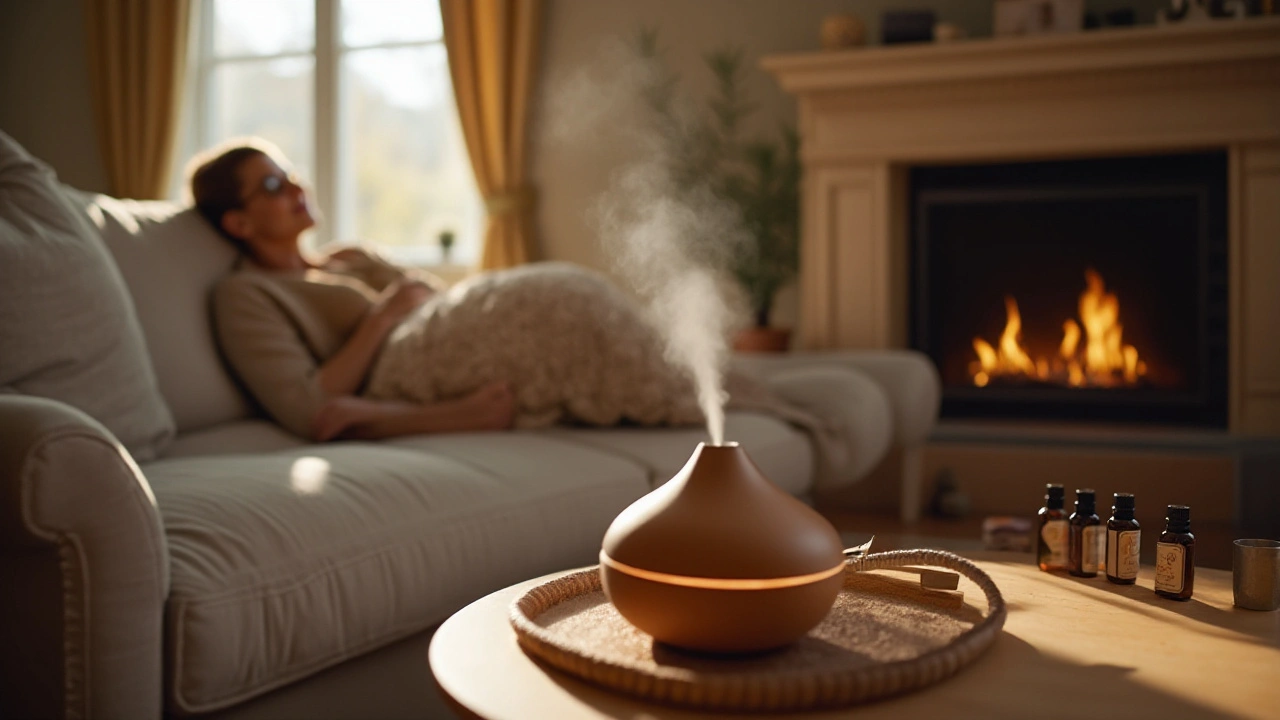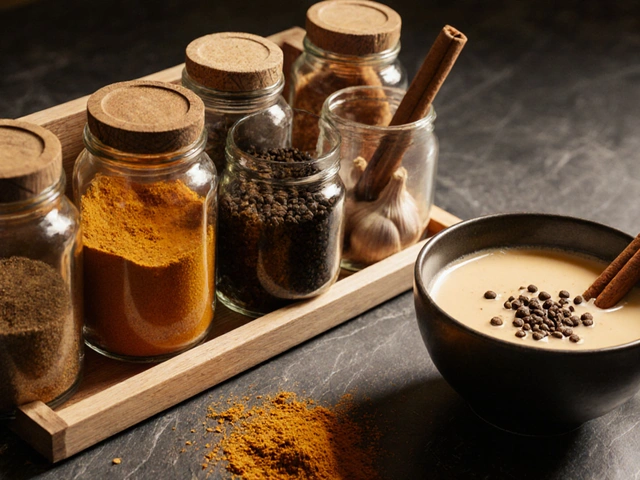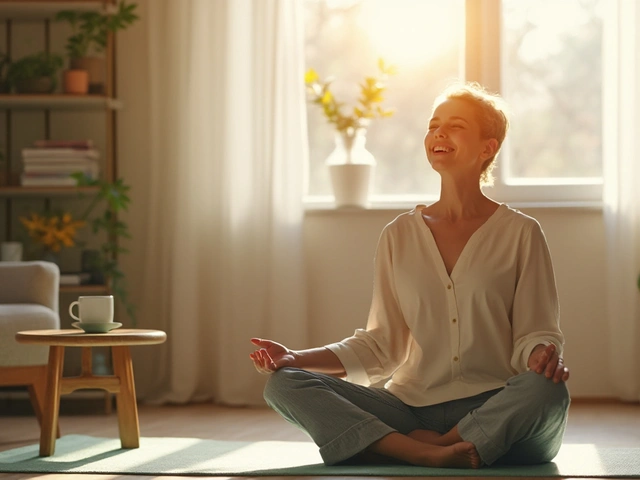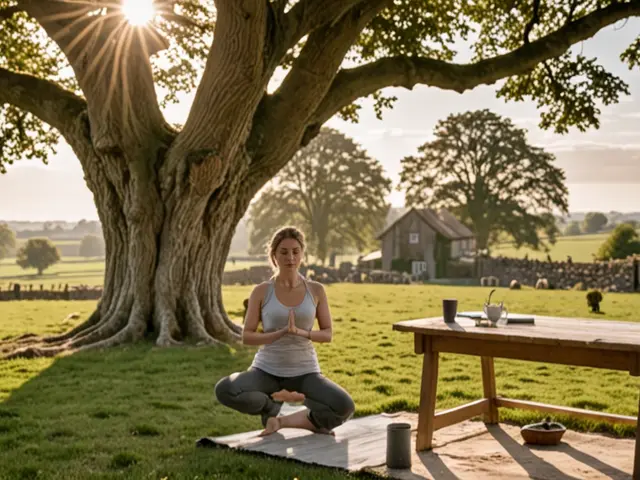Essential oils have found their way into the hearts and homes of many people worldwide. These concentrated plant extracts offer a variety of health benefits, both for the body and mind.
But what exactly are essential oils, and why are they so revered? In this guide, we'll explore the science behind essential oils, delve into their various types, and highlight both their mental and physical health benefits. Plus, we'll provide handy tips on using essential oils safely and even share some DIY recipes to try at home.
If you're curious about how these potent oils can improve your well-being, read on to uncover the secrets of essential oils!
- The Science Behind Essential Oils
- Common Types of Essential Oils
- Mental Health Benefits
- Physical Health Benefits
- How to Use Essential Oils Safely
- DIY Recipes and Tips
The Science Behind Essential Oils
Essential oils are powerful plant extracts known for their aromatic properties. They are derived through distillation or mechanical methods, such as cold pressing. These oils capture the plant’s scent and flavor, known as its essence.
The science of essential oils is a fascinating journey into the world of chemistry and biology. Each essential oil contains a unique composition of aromatic compounds, including terpenes, esters, alcohols, and phenols. These compounds are what grants essential oils their potent medicinal properties.
One well-known fact is that essential oils have been used for thousands of years, dating back to ancient Egypt, where they were used in mummification and medicine. Modern studies have shown that these oils can offer real health benefits. For instance, peppermint oil is known for its ability to relieve headaches and improve digestion, while lavender oil is praised for its calming effects and ability to promote sleep.
Dr. Jane Buckle, an expert in clinical aromatherapy, states, "Numerous studies support the efficacy of essential oils, showing that their chemical structures can act similarly to pharmaceutical drugs but with fewer side effects."
One way to understand the efficacy of essential oils is through the concept of synergy. Synergy occurs when the combination of individual compounds in an oil produces a more profound effect than any single component alone. This is why combining different essential oils can sometimes enhance their therapeutic benefits.
How Do Essential Oils Work?
Essential oils interact with the body in two primary ways: through absorption and inhalation. When applied to the skin, they penetrate the dermal layer and eventually enter the bloodstream. This is why it's essential to dilute essential oils with a carrier oil, like coconut or jojoba oil, before topical application to prevent irritation.
Inhalation is another common method of using essential oils. When breathed in, the aromatic compounds travel directly to the brain, influencing the limbic system, which is responsible for emotions, memory, and arousal. This direct pathway to the brain helps explain why scents can have such a powerful impact on our mood and psychological state.
Currently, a growing body of research supports the health benefits of essential oils. A table summarizing key findings is shown here:
| Essential Oil | Benefit | Supporting Research |
|---|---|---|
| Peppermint | Improves Digestion, Relieves Headaches | Journal of Alternative and Complementary Medicine |
| Lavender | Promotes Sleep, Reduces Anxiety | Journal of Clinical Psychopharmacology |
| Tea Tree | Antimicrobial, Anti-inflammatory | Clinical Microbiology Reviews |
Whether you're interested in aromatherapy or topical applications, understanding the science behind essential oils will help you use these natural remedies more effectively and confidently.
Common Types of Essential Oils
When it comes to essential oils, the variety seems endless. These natural remedies have been extracted from various plants, each offering unique benefits for health and well-being. Among the most popular are lavender, peppermint, eucalyptus, tea tree, and lemon. Each of these oils has its own specific uses and advantages that make it a favorite in households and among wellness enthusiasts.
Lavender oil is perhaps one of the most versatile and widely-used essential oils. Known for its calming and relaxing properties, it's often used to promote better sleep and reduce anxiety. It can also be applied to minor cuts and bruises to speed up the healing process. A study published in the Journal of Alternative and Complementary Medicine found that lavender oil significantly reduced stress levels among participants.
"Lavender oil has been shown to reduce anxiety levels in clinical studies," states Dr. Jane Buckle, an expert in clinical aromatherapy.
Peppermint oil is another essential oil with a myriad of uses. Its invigorating scent can help to boost energy levels, improve focus, and alleviate headaches. It's also widely recognized for its ability to relieve digestive issues such as bloating and nausea. A few drops of peppermint oil in a diffuser can invigorate the senses and enhance concentration. It's a staple for those who need a quick pick-me-up during long workdays.
Eucalyptus oil, easily identifiable by its fresh and clean aroma, is often used in treatments for respiratory issues. Its anti-inflammatory, decongestant, and antibacterial properties make it popular for relieving colds, sinusitis, and other respiratory conditions. Just a few drops in a bowl of hot water can create a steam inhalation therapy that clears nasal passages and alleviates congestion.
Tea tree oil, also known as melaleuca oil, is celebrated for its potent antimicrobial properties. It's a powerful addition to a natural first aid kit, useful for treating skin ailments such as acne, fungal infections, and minor wounds. Its application can range from spot treatments for pimples to addition in homemade cleaning products. The Australian Aboriginal people have been using tea tree oil as a medicinal treatment for centuries.
Lemon oil stands out with its vibrant, zesty fragrance and its wide array of uses. The oil is often utilized for its detoxifying and rejuvenating effects. Its fresh scent is a natural mood enhancer, and it is often incorporated into household cleaning products due to its antibacterial properties. Additionally, many people add lemon oil to their skincare routines to fight oily skin and brighten their complexion.
While these are among the most common essential oils, the list extends to other notable mentions such as rosemary, frankincense, chamomile, and ylang-ylang. Rosemary oil can be particularly beneficial for enhancing memory and concentration. Frankincense is prized for its anti-inflammatory properties and spiritual significance. Chamomile offers soothing properties that can calm both the mind and skin. Lastly, ylang-ylang is known for its uplifting and aphrodisiac qualities.
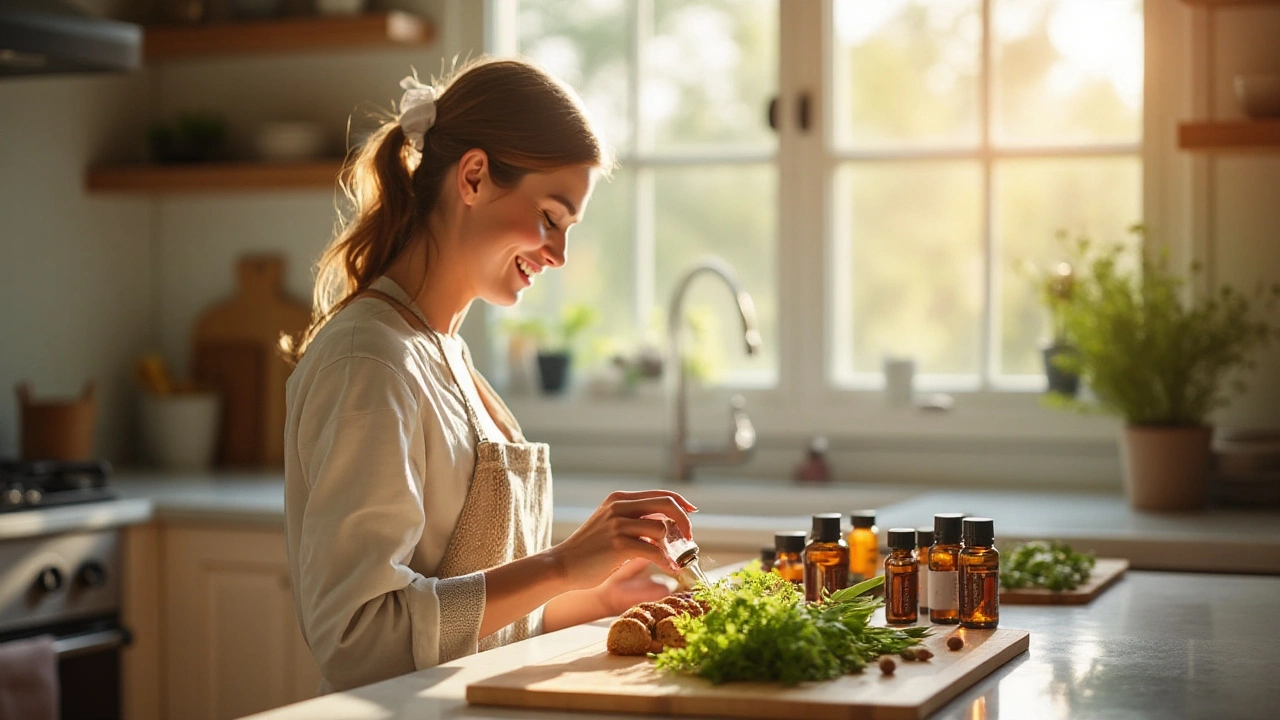
Mental Health Benefits
Essential oils have long been heralded for their capacity to enhance mental well-being. Aromatherapy, which employs **essential oils**, is a significant branch of complementary health practices that focuses on using aromatic compounds to improve emotional states.
The calming properties of lavender oil are well-documented. Studies suggest that lavender can help reduce anxiety and create a sense of calmness and relaxation. According to a study published in the Journal of Alternative and Complementary Medicine, inhaling lavender essential oil can noticeably lessen anxiety levels.
Beyond lavender, **essential oils** like peppermint and eucalyptus can invigorate the senses and boost mental clarity. A few drops of peppermint oil in a diffuser can help clear the mind and enhance focus, making it easier to tackle cognitive tasks.
For those dealing with chronic stress, chamomile and frankincense oils could offer relief. These oils have been noted for their sedative effects, which can help lower cortisol levels and create a feeling of inner peace.
According to Mind Body Green, “Chamomile essential oil is widely used in aromatherapy to reduce stress and promote sleep due to its relaxant properties.”
Citrus essential oils like lemon and orange are known to uplift mood and dispel negativity. These oils are often used in settings where a positive atmosphere is crucial, such as during gatherings or workplace meetings.
Incorporating **essential oils** into a daily routine can be as simple as using a diffuser, applying diluted oils topically, or adding a few drops to a warm bath. Such habits can help foster a consistent sense of well-being and equip individuals to better handle everyday stresses.
For those new to essential oils, it's wise to start with tried-and-true options like lavender or chamomile. Gradually, different oils can be introduced based on specific mental health needs. And remember, while **essential oils** offer many benefits, they should complement other healthy lifestyle choices and not replace conventional treatments for mental health issues.
Physical Health Benefits
When it comes to improving physical health, essential oils have much to offer. Many people use essential oils to aid with digestion, reduce inflammation, and even to manage pain. Lavender oil, for instance, is renowned for its calming properties, not only for the mind but for the body too. Rubbing a few drops on your temples can alleviate headaches, making it a natural alternative to over-the-counter pain relievers.
Moreover, tea tree oil is a powerhouse when it comes to combating infections due to its antibacterial and antiviral properties. It’s often used in treating minor cuts and scrapes. Just a drop or two on the affected area can aid in faster healing and prevent infection. This makes it a must-have in your first aid kit.
According to Dr. Josh Axe, a certified doctor of natural medicine, 'Tea tree oil can be used to get rid of body odor thanks to its anti-microbial properties that destroy the bacteria on your skin that cause body odor.'
For those looking into respiratory health, eucalyptus oil is your best friend. It's famous for its ability to soothe respiratory issues. Adding a few drops into a diffuser or a bowl of hot water for steam inhalation helps to clear the airways, making it essential during cold and flu season. It is especially effective in decongesting nasal passages and easing breathing difficulties.
Boosting Immunity
Another incredible benefit of essential oils is their potential to boost the immune system. Oils like oregano and thyme are rich in antioxidants, which help in fighting off harmful free radicals in the body. Their antimicrobial properties make them effective in warding off infections when used regularly.
Statistics suggest that incorporating essential oils like these into your daily routine can reduce the incidence of common colds and flu. One small study published in the Journal of Essential Oil Research found that the use of essential oil inhalation reduced symptoms in 70% of participants.
Pain Relief
When it comes to managing pain, essential oils offer a natural alternative to synthetic painkillers, which often come with a host of side effects. Peppermint oil is particularly effective in easing muscle and joint pain. Its cooling sensation provides quick relief, especially after intense physical activity. Applying diluted peppermint oil to sore muscles can work wonders.
Likewise, chamomile oil has anti-inflammatory properties that make it useful for treating conditions like arthritis. Regular use can significantly reduce swelling and pain, improving overall mobility and quality of life. While more research is needed, initial studies are promising and suggest these oils could be part of a comprehensive pain management plan.
Incorporating essential oils into your health routine can be a natural and effective way to improve your physical well-being. Whether it's easing pain, boosting immunity, or treating minor ailments, these oils offer a range of benefits that make them worth considering.
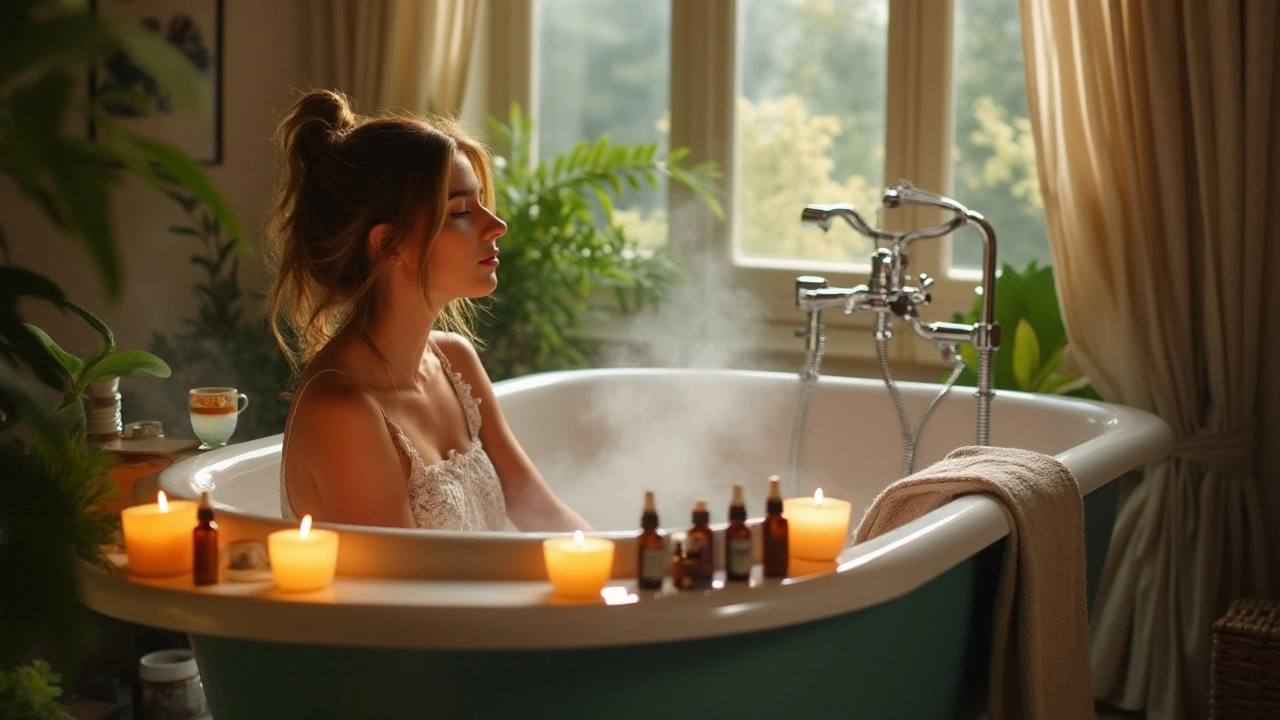
How to Use Essential Oils Safely
Using essential oils can be incredibly beneficial for your health, but it’s crucial to use them safely. Essential oils are highly concentrated and potent, meaning they can cause side effects if not handled properly. Knowledge is key when it comes to reaping the health benefits without any risks. Here are some essential tips and guidelines for safe use.
Dilution Is Essential
Always dilute essential oils with a carrier oil before applying them to your skin. Carrier oils, such as coconut oil, almond oil, or jojoba oil, help dilute the potency of essential oils while making it easier for your skin to absorb. A good rule of thumb is to use one drop of essential oil per teaspoon of carrier oil. This reduces the risk of skin irritations, allergic reactions, and other adverse effects.
Patch Testing
Before using any new essential oil, perform a patch test to check for any adverse reactions. Apply a small amount of diluted essential oil to a patch of skin, usually on your forearm. Wait for at least 24 hours and observe any signs of redness, irritation, or discomfort. If your skin shows any negative reactions, discontinue use immediately. This step can save you from unintended discomfort or more severe reactions.
Avoiding Sensitive Areas
Never apply essential oils to sensitive areas of your body, including your eyes, ears, and mucous membranes. Essential oils are too potent for these delicate tissues and can cause severe irritation or damage. For example, getting peppermint oil in your eyes can cause a burning sensation and even damage your vision temporarily. Always wash your hands thoroughly after handling essential oils to avoid accidental contact with these areas.
Proper Storage
Store your essential oils in dark glass bottles and keep them in a cool, dark place to maintain their efficacy. Heat, light, and air can degrade essential oils, reducing their potency and effectiveness. Ensure the caps are tightly closed to prevent evaporation. Proper storage guarantees the longevity of these precious oils, preserving their therapeutic properties.
Consulting Professionals
If you're pregnant, nursing, or have a medical condition, consult with a healthcare provider before using essential oils. Some essential oils can interact with medications or aggravate health conditions. For instance, people with epilepsy should avoid rosemary and eucalyptus oils due to their potential to trigger seizures. A healthcare provider can guide you in choosing oils that are safe for your specific needs.
“Essential oils can be a wonderful addition to your wellness routine if used correctly. Always prioritize safety above all,” advises Dr. Jane Doe, a renowned aromatherapy expert.
Using a Diffuser
When using a diffuser, follow the manufacturer's instructions for water and oil ratios. Diffusers disperse essential oils into the air, making it easy to inhale their therapeutic benefits. Typically, 5-10 drops of essential oil are enough for a standard-sized diffuser. Avoid overloading it, as too much oil can cause headaches or respiratory issues. Also, allow for some ventilation to prevent the build-up of excessive concentrations of essential oils in the air.
Educating Yourself
Take the time to educate yourself about each essential oil you plan to use. Research its benefits, recommended uses, and potential risks. Essential oils are not a one-size-fits-all remedy; each oil has unique properties and appropriate applications. Informing yourself will empower you to use these natural remedies effectively and safely.
By following these guidelines, you can enjoy the many health benefits of essential oils while minimizing risks. Always remember that safety comes first in your journey towards better health and well-being.
DIY Recipes and Tips
Making your own essential oil blends at home can be both fun and rewarding. You get to control the ingredients and create personalized scents tailored to your specific needs. Here are some simple and effective recipes to get you started.
One popular blend is a stress-relief mix. To make it, you'll need lavender, peppermint, and frankincense essential oils. Simply combine 10 drops of lavender, 5 drops of peppermint, and 5 drops of frankincense in a small roller bottle. Fill the rest with a carrier oil like jojoba or almond oil. Shake it well and apply it to your wrists and temples whenever you feel stressed.
For a refreshing room spray, mix 20 drops of lemon essential oil, 20 drops of tea tree oil, and a cup of distilled water in a spray bottle. Shake well before each use and spritz it around your home to enjoy a clean, uplifting scent. This blend is especially useful if you want to freshen up your living space naturally.
If you're looking to boost your immune system, try making a wellness roller blend. In a 10ml roller bottle, add 10 drops of eucalyptus, 10 drops of lemon, 10 drops of oregano, and fill the rest with a carrier oil. Roll this blend onto the bottoms of your feet before you go to bed or when you feel like you're coming down with something.
Essential oils can also work wonders for your skin. Create a nourishing facial serum by mixing 2 drops of rose essential oil, 1 drop of lavender oil, and 1 drop of tea tree oil with a tablespoon of rosehip seed oil. Apply a few drops to your face in the evening after cleansing, and you'll wake up with softer, more radiant skin.
Don't forget about the relaxing properties of essential oils! For a calming bath, add 10 drops of chamomile essential oil and 10 drops of lavender oil to a cup of Epsom salts. Sprinkle the mixture into your bathwater, stir well to disperse the oils, and soak for at least 20 minutes. This blend not only relaxes the muscles but also soothes the mind.
Another great DIY tip is to make your own car freshener. Grab a small cloth bag and fill it with cotton balls. Add 10 drops of your favorite essential oils, such as peppermint and eucalyptus, onto the cotton balls. Seal the bag and place it under your car seat. Every time you get in the car, you'll enjoy a pleasant aroma that can also help to keep you alert while driving.
A fantastic multitasking blend can be created for both hair growth and scalp health. Combine 5 drops of rosemary essential oil, 5 drops of lavender oil, and 5 drops of cedarwood oil in a small glass bottle. Add half a cup of coconut oil and mix well. Massage the oil blend into your scalp and leave it on for at least 30 minutes before washing your hair. This blend helps improve circulation and promotes hair growth while keeping your scalp healthy.
"Essential oils offer a natural and effective way to enhance your health and well-being." - National Association for Holistic Aromatherapy
Make sure always to use essential oils responsibly. When creating blends, remember to dilute oils properly to avoid skin irritation. Store your DIY creations in dark glass bottles to preserve their potency. If you're trying a new oil, it's wise to do a patch test first to ensure you don't have an allergic reaction. Essential oils can be potent, so a little usually goes a long way.
With these <
